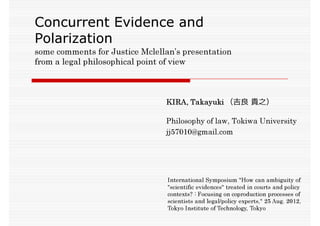
2012.08.25 On Concurrent Evidence
- 1. Concurrent Evidence and Polarization some comments for Justice Mclellan’s presentation from a legal philosophical point of view KIRA, Takayuki (吉良 貴之) Philosophy of law, Tokiwa University jj57010@gmail.com International Symposium "How can ambiguity of "scientific evidences" treated in courts and policy contexts? : Focusing on coproduction processes of scientists and legal/policy experts," 25 Aug. 2012, Tokyo Institute of Technology, Tokyo
- 2. Purpose Some comments from a legal philosophical point of view Not only the legal decision-making process in court, but also wider applicability in social contexts will be taken considered. In particular, I’d like to compare concurrent evidence with deliberation in collective decision-making. 2
- 3. On “Concurrent Evidence” Unlike adversary system, experts can discuss scientific or other highly technical issues. Their mutual examination is expected to raise quality of evidence, free from lawyers’ unproductive interference. It seems good in “scientific” sense. But I think it depends on types of issues. I’d like to classify the types, by referring to professor Stirling’s former discussion, too. 3
- 4. On a scientific issue – “uncertainty” On a scientific issue (“uncertainty”), concurrent evidence by number of experts will be very effective Because experts’ mutual examination of their evidence will correct careless mistakes. Their view will converge by degrees. In this process, there is not disagreement about values, or how to frame the issue. 4
- 5. Disagreement about values or framing – “ambiguity” If they disagree about values or framing, it is in state of “ambiguity” in Stirling’s classification. Convergence of their view will not be guaranteed. The conflicts will often become more serious, and divide into two extremely opposite and adversary sides. This phenomenon is called “polarization,” in political theory of deliberative democracy. 5
- 6. Polarization (1) On highly controversial problems connected to political values, as more people participate in discussion, this divergence often occurs. It is because people who have extreme opinions are liable to lead the discussion, and pull in other people who have middle opinions to their side with group pressure. 6
- 7. Polarization (2) examples Discussion of green-house effect and backlash to it is typical. In Japan, recent “Deliberative Poll” about nuclear plants or discussion of low level radiation effects may show the tendency. Though this depends on default framings, recent positivist political science studies show the general tendency in deliberation. 7
- 8. Institutional safe guards for the polarization problem In concurrent evidence, such polarization may be rare. The purpose of concurrent evidence is not argumentations, but, at first, to manifest each standpoint, and then to co-operate to find the truth with positivist attitude. This process should be evidence-based, and also should be adequately led by judge. Therefore, concurrent evidence has institutional safe guards for the polarization problem. 8
- 9. Does possibility of polarization limit concurrent evidence ? But that does not mean “zero-risk”. In spite of all such efforts, serious value conflicts or polarization may occur. The risk is a limit of concurrent evidence, and at the same time, the most significant characteristics of it. Exceptions often “open up” the essence. 9
- 10. Is a decision “beyond science” “unscientific” ? In the case that polarization occurs and experts’ opinions seriously diverge, judge must make a decision beyond science, perhaps, existentially. But it does not mean just an unscientific or irrational determination. 10
- 11. visualization and differentiation In the process, visualizations and differentiations are made, such as scientific and unscientific, or certain and uncertain issues. Judges or other decision-makers no longer can pretend to make value-free, neutral, or scientific decisions. Polarization after adequate concurrent evidence process or deliberation indicates that there were conflicts of values, framing, or at least condition setting from the beginning. 11
- 12. Not in convergence, but in divergence Clear polarization and bare value conflicts are rare in concurrent evidence, but they can exist everywhere in subtler version. By being sensitive to it, we can refrain from both excessive relativism and scientism. Essence of concurrent evidence exists in divergence rather than convergence. 12
